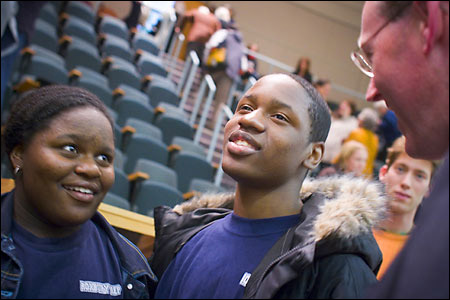Farmer: Aiding poor must transcend boundaries
Globalization has brought the once “distant needy” to our doorstep and created a global society whose obligations to help the poor transcend national boundaries, Paul Farmer, the Maud and Lillian Presley Professor of Social Medicine, said Tuesday (May 2).
Farmer, who has worked extensively to provide health care to the poor in the United States and in the developing world, said that goods, services, and people easily move across national boundaries today to provide economic benefits to first-world consumers. Medicines and aid to uplift the poor in developing nations, however, remain restrained by national borders.
The result is a world of growing inequality where the benefits accrue to those who are wealthy while illness and want are heaped upon those already less fortunate.
“HIV and [other diseases] cross boundaries, while ARV [antiretroviral drugs] and other medicines are stuck in customs,” Farmer said.
Inequality generally – and unequal access to health care specifically – must be addressed by wealthy nations like the United States and wealthy institutions like Harvard, which have both the means and the clout to make a difference, Farmer said.

Farmer made his comments during the George W. Gay Lecture in Medical Ethics, delivered to a packed lecture hall in Harvard Medical School’s Tosteson Medical Education Center.
Director of Harvard Medical School’s Division of Medical Ethics Dan Brock introduced Farmer, saying his work with the poor, mainly in Haiti and Rwanda, make him well-qualified to talk about medical ethics.
Much of Farmer’s work with the poor occurs through Partners In Health, a nonprofit he helped found, and as medical director of Clinique Bon Sauveur, a rural Haitian charity hospital. Farmer, who also serves as associate chief of Brigham and Women Hospital’s Division of Social Medicine and Health Inequalities, challenged the prevailing attitude that quality health care couldn’t be provided in resource-poor settings by pioneering community-based treatments for AIDS and tuberculosis, Brock said.
“I think of Paul as a man who recognizes social injustice for what it is but who isn’t willing to tolerate it and just do nothing about it,” Brock said.
Farmer’s talk, “Rich World, Poor World: Medical Ethics and Global Inequality,” lasted for more than an hour. Farmer said he believes that health care should be a right rather than a commodity, adding that inequality in access and treatment occurs wherever health care is bought and sold.
“Social inequalities, wherever they exist, relate to who gets care and who does not,” Farmer said.
Farmer likened the developing world’s view of wealthy nations like the United States to viewing a scene through a one-way mirror: They see our conspicuous consumption but we see very little of their suffering.
“Our comfort and excess are more visible to them than their needs are to us,” Farmer said. “Really it’s like a one-way mirror, the poor sees all the spectacle and opulence.”
In addressing the health ills of the poor, one should not ignore the social context of inequality and injustice that has led to it, he said. Farmer said that discussion and treatment of Native American alcoholism should be viewed with an eye to the genocide practiced by European settlers on native peoples. Similarly, he said, racism and historical slavery should be kept in mind when seeking the roots of drug addiction among African Americans.
As we examine global society more closely, Farmer said, national boundaries blur and global obligations rise. He called the growing global society “a dizzying, unequal space” and said we need to focus our attention on global inequality.
Fighting inequality can begin here in the United States, Farmer said, with a variety of local programs to address community situations. The U.S. federal government, Farmer said, is an important player because of its global clout, but its policies need changing.
Universities such as Harvard should acknowledge global poverty and ensure the knowledge they generate is used for the common good.
“It’s less about assisting the distant needy and more about repairing a broken world,” Farmer said.




